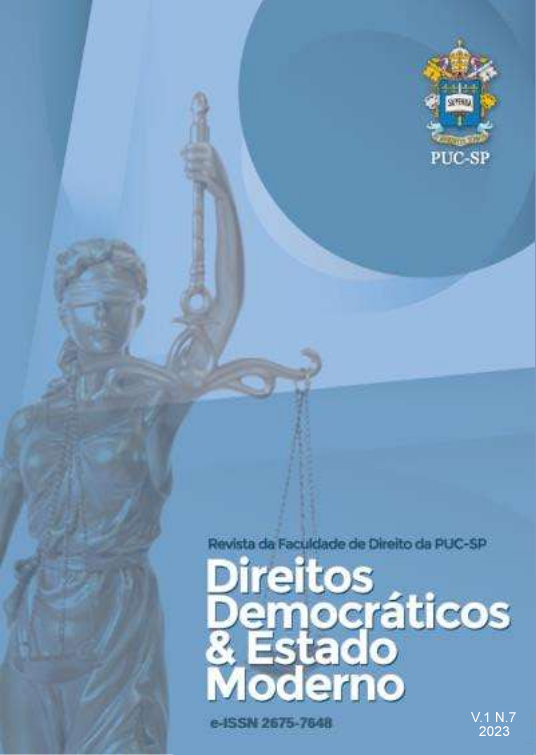O impacto da Figura do Presidente da República em Portugal e no Brasil
DOI:
https://doi.org/10.23925/ddem.v.1.n.7.59706Palavras-chave:
Semipresidencialismo, Presidencialismo, Presidente da República, Direito Constitucional ComparadoResumo
A temática do semipresidencialismo com certa periodicidade acaba sendo alçada aos debates públicos sobre o modelo mais adequado para a organização jurídico-política brasileira. Nesse contexto, com base na expressão portuguesa do semipresidencialismo, o presente texto busca examinar as atribuições e os poderes constitucionais do Presidente da República Portuguesa em comparação com o Presidente da República Federativa do Brasil. A metodologia adotada é a revisão de literatura, a pesquisa qualitativa e o método dedutivo. O estudo analisa as convergências e as divergências nas respectivas atuações, bem como a sua relação com os principais atores dos Poderes Legislativo e Judiciário em ambos os países, com o intuito de comparar o impacto da figura presidencial em cada território.
Referências
BLANCO DE MORAIS, Carlos. O Sistema Político. Coimbra: Almedina, 2018.
BRASIL. Constituição (1988). Constituição da República Federativa do Brasil. Disponível em: <http://www.planalto.gov.br/ccivil_03/constituicao/constituicao.htm> Acesso em 20 de abril de 2022.
CANOTILHO, J. J. Gomes. Direito Constitucional e Teoria da Constituição. 7ª ed., Coimbra: Almedina, 2003.
CANOTILHO, J.J. Gomes; MOREIRA, Vital. Os Poderes do Presidente da República. Coimbra: Coimbra Editora, 1991.
CHEIBUB, José Antonio; ELKINS, Zachary; GINSBURG, Tom. Latin American Presidentialism in Comparative and Historical Perspective, Texas Law Review, Vol. 89, 2011, pp. 1709-1739.
FIGUEIREDO, Argelina Cheibub; LIMONGI, Fernando. A Crise Atual e o Debate Institucional, Revista Novos Estudos, v. 36, São Paulo, 2017, pp. 79-97.
FIGUEIREDO, Argelina Cheibub; LIMONGI, Fernando. Political Institutions and Governmental Performance in Brazilian Democracy in The Political System of Brazil, DE LA FONTAINE, Dana; STEHNKEN, Thomas (editors), Heidelberg: Springer, 2016, pp. 63-82.
ITÁLIA. Constituição (1947). Constituição da República Italiana. Disponível em: <https://www.senato.it/sites/default/files/media-documents/COST_PORTOGHESE.pdf> Acesso em 20 de abril de 2022.
LIMONGI, Fernando. A Democracia no Brasil: Presidencialismo, Coalizão Partidária e Processo Decisório, Revista Novos Estudos, n. 76, São Paulo, 2006, pp. 17-41.
LINZ, Juan J. The Perils of Presidentialism, Journal of Democracy, Vol. 1, n. 1, 1990, pp. 51-69.
NOVAIS, Jorge Reis. Semipresidencialismo, 2ª ed., Coimbra: Almedina, 2021.
OTERO, Paulo. Direito Constitucional Português, Vol. II, Almedina: Coimbra, 2017.
PORTUGAL. Constituição (1976). Constituição da República Portuguesa. Disponível em: <https://mobile.dre.pt/constituicao-da-republica-portuguesa> Acesso em 20 de abril de 2022.
PORTUGAL. Folha Informativa Moções (2015). Divisão de Informação Legislativa Parlamentar da Assembleia da República. Disponível em <https://www.parlamento.pt/ArquivoDocumentacao/Documents/Folha_Mocoes.pdf> Acesso em 20 de maio de 2022.
Downloads
Publicado
Como Citar
Edição
Seção
Licença
Copyright (c) 2023 Direitos Democráticos & Estado Moderno

Este trabalho está licenciado sob uma licença Creative Commons Attribution 4.0 International License.

Este obra está licenciada com uma Licença Creative Commons Atribuição 4.0 Internacional.
Revista DD&EM - ISSN 2675-7648
















